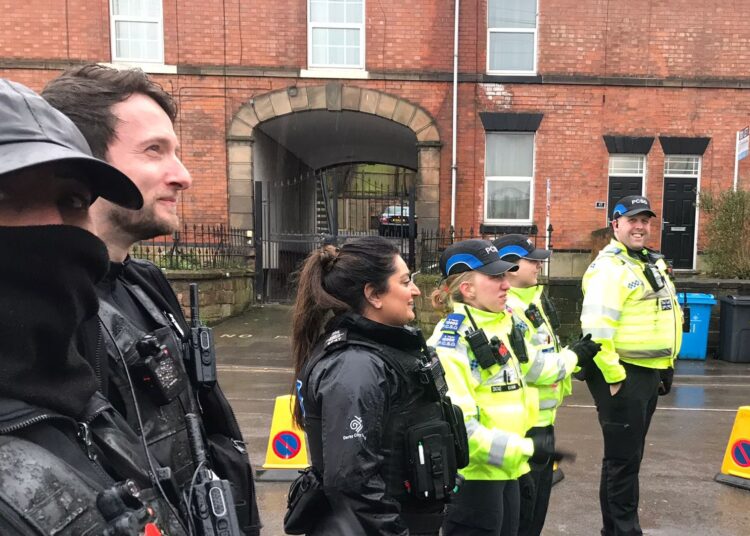By Charlotte Webster-
The latest data from police and crime commissioners (PCCs) reveals that more than 30,000 additional hours of uniformed patrols, accompanied by hundreds of arrests and stop-and-search operations, have resulted in a remarkable 30% decrease in ASB in designated ‘hotspot’ areas.
Launched six months ago, the government’s Anti-Social Behavior Action Plan has been actively addressing the mounting issue of ASB that has left communities reeling.
The plan is designed to provide police and local partners with the tools necessary to tackle this menace head-on.
Since the rollout of hotspot uniformed patrols in ten pilot areas, the initiative has led to over 250 arrests, more than 600 stop-and-search operations, and approximately 1,000 other enforcement actions, including community protection notices and public protection orders.
According to Crime and Policing Minister Chris Philp, the impact of ASB on communities is profound.
He stated, “Anti-social behavior ruins neighborhoods and brings fear and misery to local people, be it people smoking cannabis in the street, intimidating gatherings in public spaces, or acts of vandalism. We will not tolerate it.”
Philp expressed his delight that the action plan and the government’s zero-tolerance approach are making a positive impact. By empowering the police and local partners to combat ASB effectively, the government is working towards ensuring that every citizen can feel safe and proud of the place they call home.
The Anti-Social Behavior Action Plan encompasses an investment of up to £20 million across 16 pilot areas, which will test both ‘hotspot’ police and enforcement patrols and an ‘Immediate Justice’ scheme.
These initiatives aim to deliver swift and visible punishments to those engaging in ASB. Some areas are still in the process of trialing both schemes.
The encouraging statistics do not stop there. Several of the trial ‘hotspot’ areas have witnessed remarkable declines in ASB incidents. For instance, Lancashire Constabulary reported a 36% reduction in ASB incidents in Brunswick, Blackpool, compared to the same period last year when hotspot patrols were not in place.
Similarly, Staffordshire Police has experienced a combined 20% drop in reported ASB incidents across five locations in Stoke-on-Trent and Newcastle under-Lyme compared to the previous year.
These positive outcomes have fueled optimism, with plans to deliver at least 150,000 hours of additional individual police and partner ‘hotspot’ patrols by March 2024. After thorough evaluation, this initiative will be extended to all police forces in England and Wales later in the year.
The government’s commitment to addressing ASB extends beyond statistical improvements. Possession of nitrous oxide, commonly known as ‘laughing gas,’ will be illegal from November 8, 2023.
This move aligns with the Home Secretary’s pledge to combat rampant drug-taking in local communities and the associated ASB.
Furthermore, the government has made significant investments in local projects to tackle ASB, acquisitive crime, and violence against women and girls.
Transport Safety Officers have been provided with additional funding of up to £2.5 million to enhance public transport safety. The penalties for graffiti, littering, and fly-tipping have been increased, with fines of up to £500 and £1,000.
Moreover, an extra one million hours of youth services have been allotted to areas with the highest rates of ASB, focusing on prevention.
Looking ahead, an Anti-Social Behavior One-Stop-Shop will be launched, enabling the public to report ASB and receive feedback on responses. Landlords and housing associations will also have more authority to evict unruly tenants engaging in ASB.
The government is committed to creating safer public spaces by allocating up to £5 million for the restoration of parks and green areas. This includes the installation of new CCTV, repairs to equipment and playgrounds, and increased planting of trees and flowers.
A police sergeant on The Eye Of Media.Com’s thinktank anonymously told this publication: ‘The government’s Anti-Social Behavior Action Plan is beginning to bear fruit, offering hope to communities coping with the menace of ASB.
‘The latest data is not just a reflection of numbers, but also a testament to the government’s unwavering commitment to ensuring safety, tranquility, and pride in every corner of the UK.
The British police force has had its share of bad publicity in the past year, but it is also helpful for the public to be appreciative of the commitment of the vast majority of law abiding police officers to make sure they are safe, and not have their peaceful and quiet enjoyment of life interfered with by criminally minded individuals’




